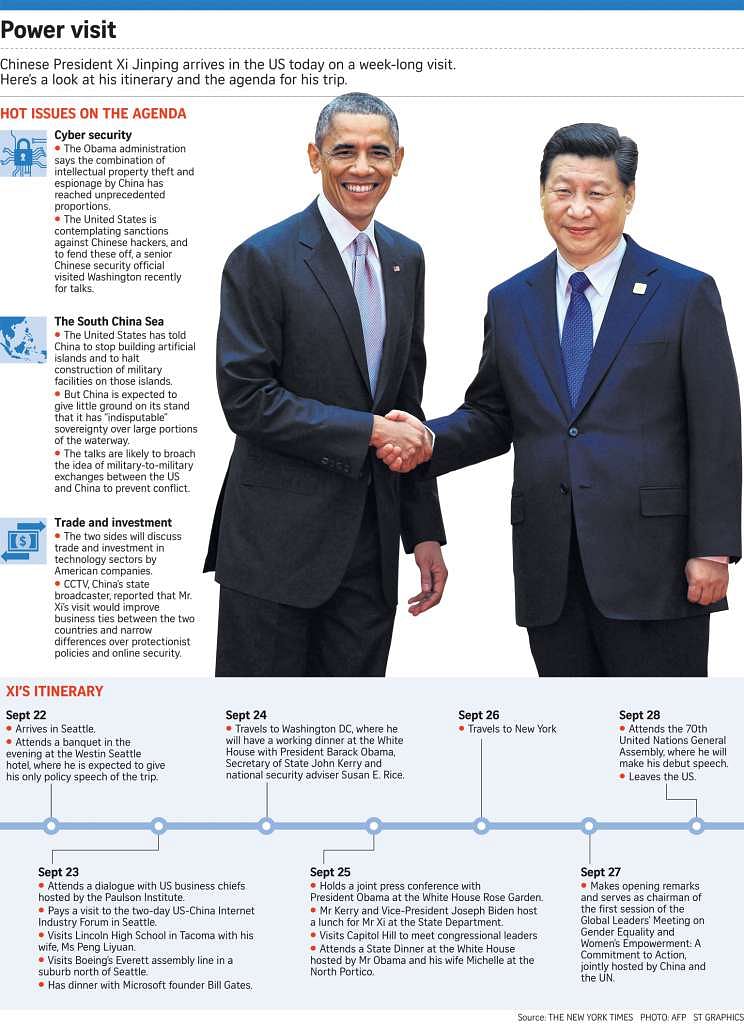While the stakes are high for Chinese President Xi Jinping as he begins his visit to the United States, analysts say Washington's expectations will be modest in comparison.
With no breakthroughs expected on any major point of contention and only baby steps taken to cool deep disagreements on cyber security, Washington pundits say the success of the visit for the US will lie in how it answers two key questions: Where does Asia fit in its current global strategy and whether the two world powers can work together despite their differences?
To some extent, those questions have been a part of all previous meetings between the two world powers, but the timing of Mr Xi's US visit provides a particularly difficult set of challenges.
For a start, the visit comes as foreign policy talk in Washington has veered decidedly away from East Asia and the administration's commitment to its "rebalance" is once again coming into question.
" You know, the news is not generally filled with talk about Asia these days. It's filled with talk about Syria and Iran and other places in the Middle East. Or maybe Russia and Putin and Eastern Europe," said Mr Richard Fontaine, president of US think-tank Centre for a New American Security.
"And it's not just about the time and attention from policymakers, it's also operational and vocational. We only have a finite number of military and diplomatic resources. So where does Asia stand in the list of American priorities?"
On the question of the relationship between the two, the challenges revolve around the growing friction, especially over cyber security and Chinese reclamation activities in the South China Sea.
Washington has accused China- based hackers of cyber spying and a recent breach of the servers of the US government's Office of Personnel Management. That attack compromised the personal files of tens of millions of federal employees.
The cyber security fallout hit a peak two weeks ago when President Barack Obama said the US was readying sanctions if the issue of cyber attacks is not resolved.
Many will be looking to see if both sides can agree to a so-called cyber "arms deal", where they commit to not initiating cyber attacks.
Complicating the visit further is the tricky domestic political environments both countries face.
The relatively weak Chinese economy is said to have taken some of the sheen off Mr Xi's leadership and he is likely to want to ensure strong optics during the visit to shore up his legitimacy at home. In particular, he will want to ensure he is treated like a major world power.
But this runs up against current US presidential campaign politics in which Republican candidates have bashed China to try and stand out from the crowded field.
At least three candidates have taken shots at China over its currency devaluation and stock market plunge, with Wisconsin governor Scott Walker going so far as to urge Mr Obama to cancel the state visit.
The US thus finds itself attempting to find a balance between pushing its own positions while trying to play ball with China.
"Americans interested in a stable relationship fear that a visit highlighting differences will feed into the 2016 presidential campaign and further complicate management of this critically important relationship," said Dr Jeffrey Bader, a senior fellow at the Brookings Institution in a blog post.
All of this adds up to relatively low expectations.
Ms Bonnie Glaser, senior adviser for Asia at the Centre for Strategic and International Studies, said prospects were good for small steps forward on cyberspace issues, including a deal on norms and a high-level dialogue mechanism, but there would be no "meeting of minds" on the South China Sea issue.
Ultimately, Dr Bader said, the most important thing both sides can do is to send the right signal to global financial markets.
"In the wake of recent market turbulence... the leaders should demonstrate that they recognise and welcome the interdependence of our economies and that they are not descending into a relationship of pure rivalry," he said.

